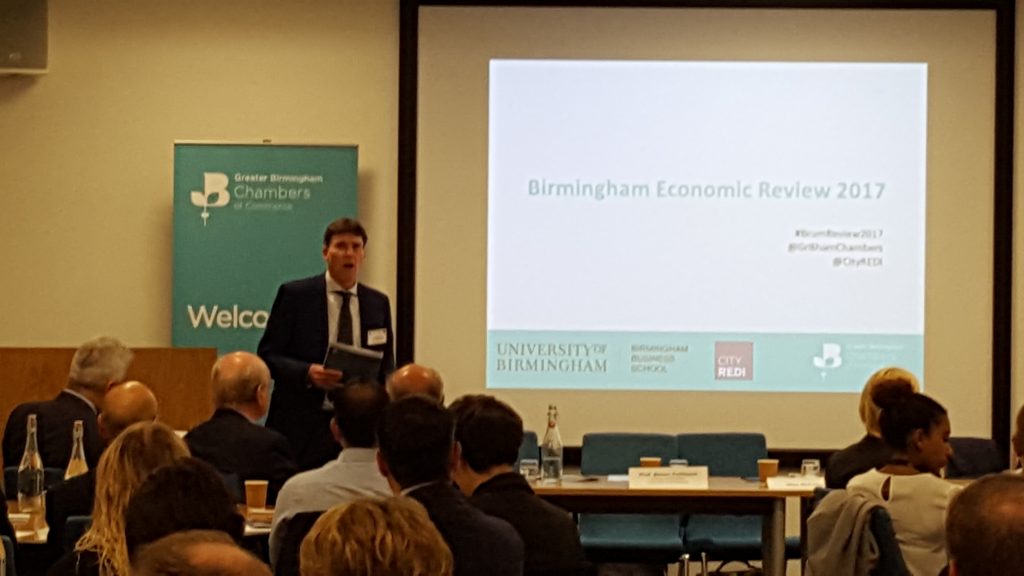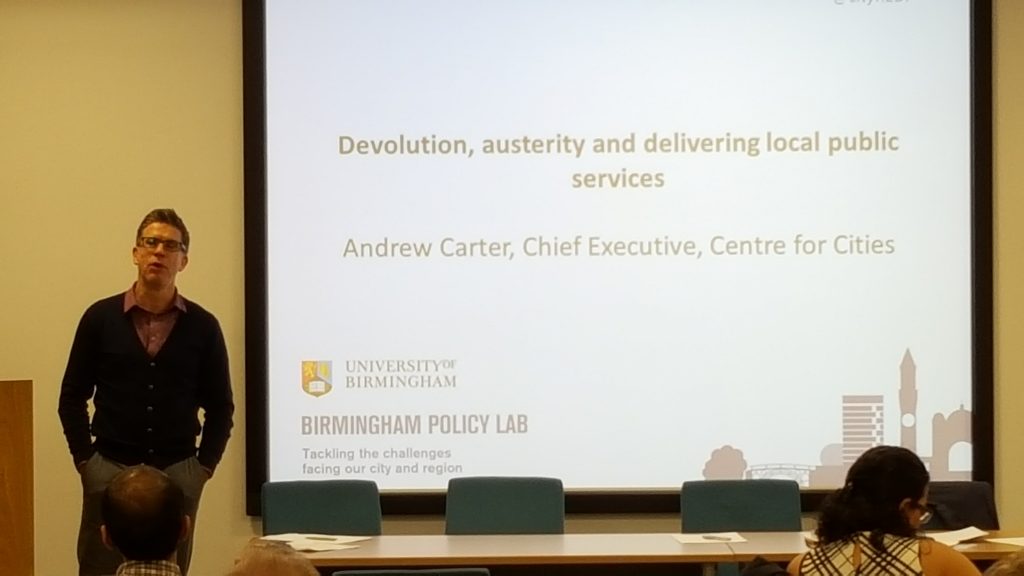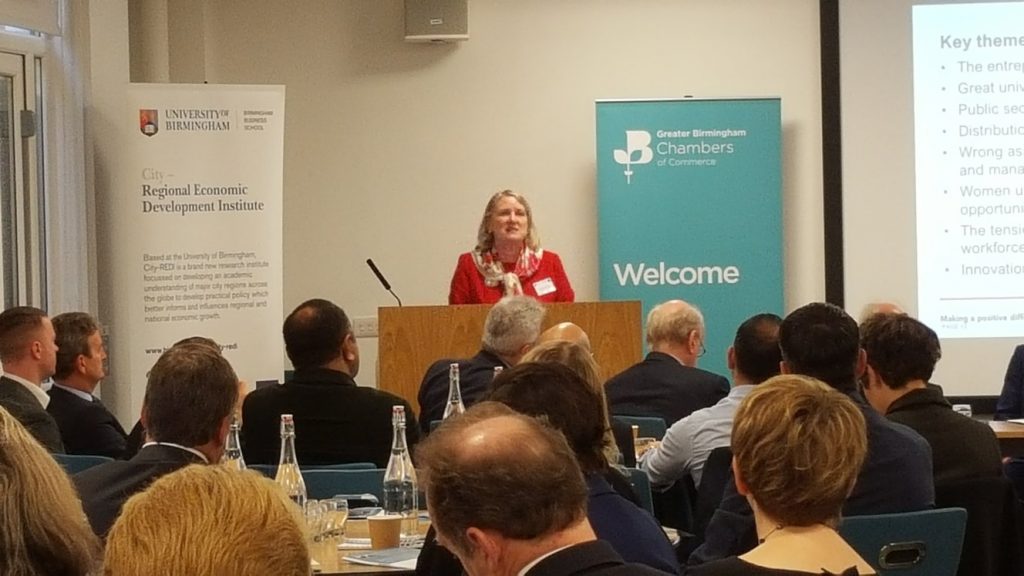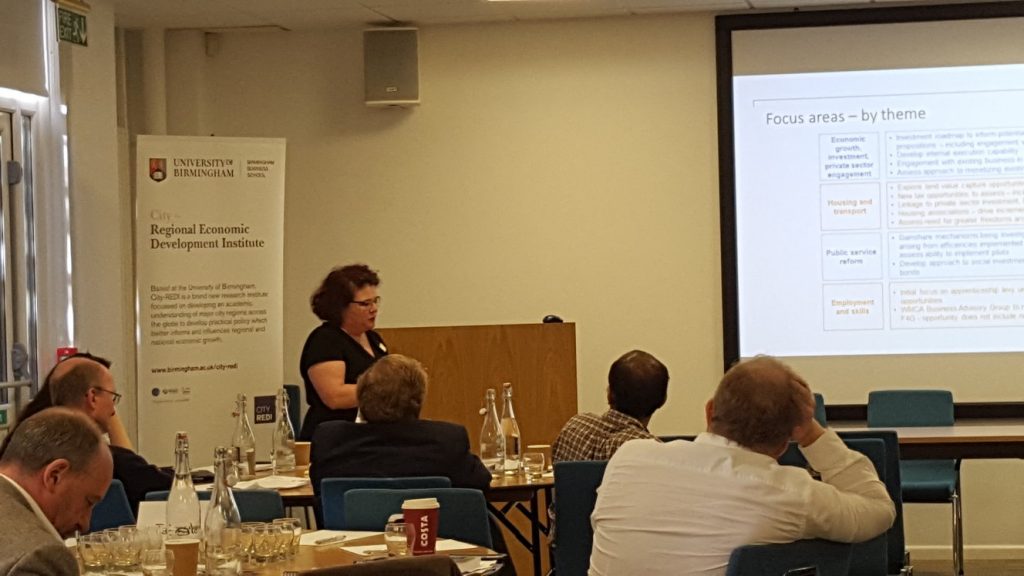
Writing economic reviews is a fine art. There is a delicate balance to be struck between the realistic representation of a place and developing our understanding so we can improve it, painting a picture which does not undermine that which we wish to improve. City-REDI and the Greater Birmingham and Solihull Chambers launched the Birmingham Economic Review last week, and through this excellent example of collaborative working between regional partners, produced a report which Andrew Carter, CEO of Centre for Cities said, “is an honest and realistic representation of the city and sets out the challenge without flannel”.
We started the event with a great summary and introduction from our very own Professor Simon Collinson, who laid down some of the challenges the region is facing, including the low business survival rates, but also highlighting an image of a city which is potentially at a turning point, with 48% of Birmingham University graduates now choosing to stay in the region after graduating.

The launch event was very well attended, with over 90 people eager to hear the panel’s thinking and get a copy of the summary, and the event was trending on Twitter in Birmingham… such was the interest! This maybe reflects the current climate, where uncertainty in the economic future of the UK is dominating thinking. Businesses don’t have the information needed to make decisions because of the uncertainty around Brexit. Just as UK businesses are struggling to understand the impacts, internationally the world looks on; such was the interest that the New York Times ran an article picking up on the review. This emphasises the significance of the City in international terms and also the interest internationally in understanding Brexit. It also supports the need for clear and independent thought in a time of uncertainty, and the importance of honest reviews. As the article highlights, we can see that investment decisions are being delayed and attention is going beyond the EU as companies are looking to post-Brexit solutions.

For Greater Birmingham however, many of the indicators are positive, despite current uncertainty and the city remains a key focus of growth and ambition in the UK. With strengths such as:
- High GVA Growth Rate
- Strategically located at the heart of major transport networks
- Above average employment shares of the following sectors: Finance and Insurance, Education, Public Administration & Defence
- Strong track record on Inward Investment & Foreign Direct Investment
- Vibrant and growing visitor economy
- Strong innovation ecosystem
- High number of start-up businesses
And as with any place, there are weaknesses the city needs to work on:
- GVA per head, per hour and per job filled underperforms the national average
- Weekly pay for full-time workers is below the national average
- A lower than average proportion of the population aged 30-44
- A lower than average employment rate, a higher than average unemployment rate
- A lower than average proportion of the population with higher level qualifications, higher than average proportion of the population with lower level qualifications
- Attracting Head Quarter operations

Many of these strengths and weakness are the same the world over in cities, however, there remains a persistent issue with productivity in the workplace driven by skills issues. Future opportunities support the feeling of optimism in the region which is managing to remain despite Brexit uncertainty:
- Major investment in infrastructure including HS2, Midland Metro and the West Midlands Rail franchise catalysing further investment and growth
- Harnessing the potential arising from the high proportion of the population being under 25
- Increasing retention of students studying in Birmingham
- Increasing the economic participation of and enterprise rates for women in the city
- Harnessing the ethnic diversity of the population to grow international trading links
- Improving the survival rate of new businesses through targeted support
To return to our introduction, if writing and producing an economic review is a fine art, it still only offers a guide or map to what we want to achieve or avoid. The real artistry comes from putting the review into action, to delivering the change. The leaders and thinkers whose thoughts we have harnessed in the review and at the event now need to look to their role in delivering on the agenda. Capturing and harnessing the optimism being generated in the city at the moment is vital to the continued growth and vitality in the face of such change.
Other articles and opinions on the Economic Review:
Job figures signal a ‘growing economy’, says CEO of Greater Birmingham Chambers of Commerce
Birmingham Updates, 18 Oct 2017
Skills shortages biggest obstacle to Birmingham’s growth
The Chamberlain Files, 25 October 2017
To sign up to our blog mailing list, please click here.
